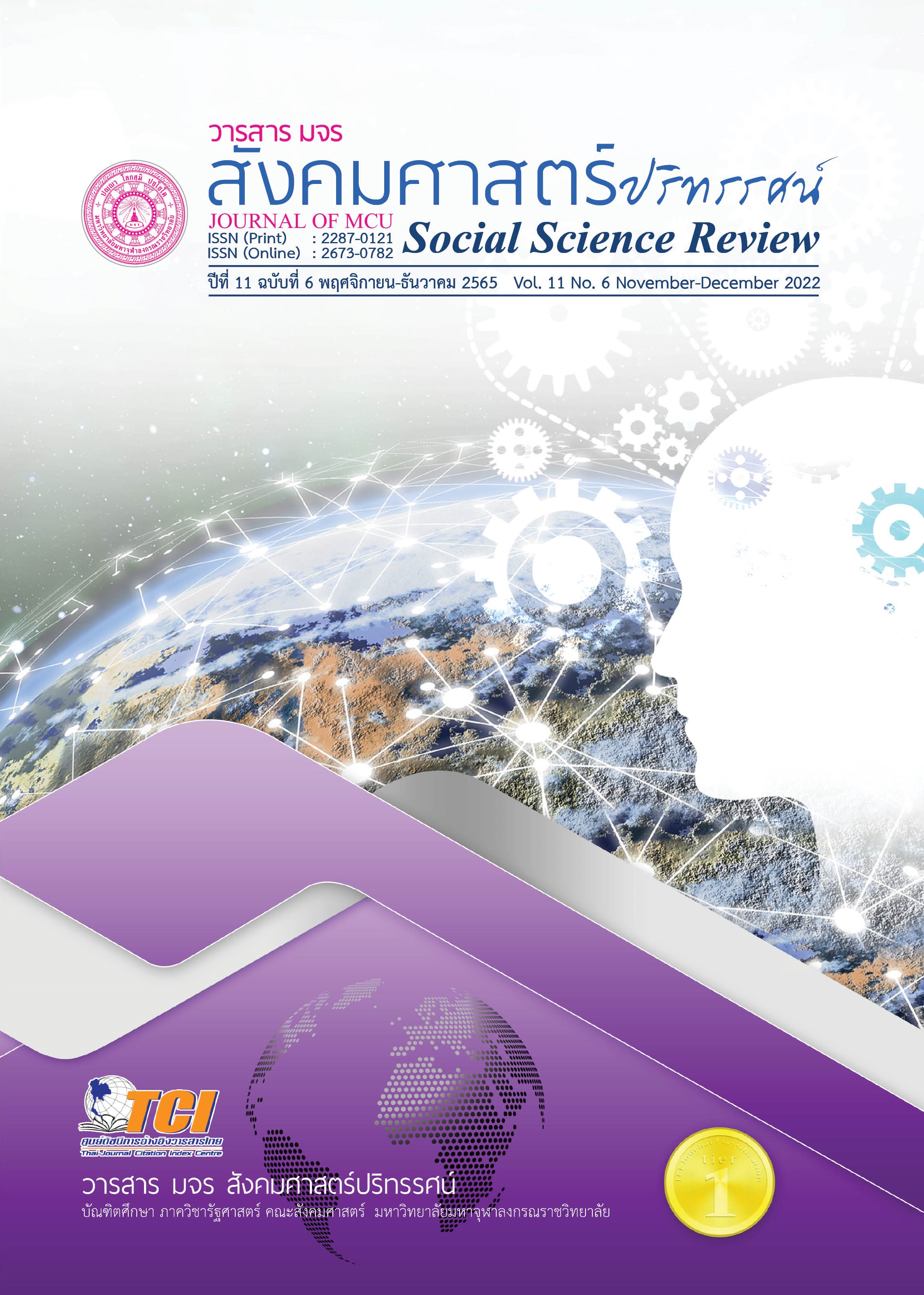ทฤษฎีฐานราก: ระเบียบวิธีวิทยาเพื่อการแสวงหาความรู้ทางสังคมศาสตร์
คำสำคัญ:
ทฤษฎีฐานราก, ระเบียบวิธีวิทยา, สังคมศาสตร์, การวิจัยเชิงคุณภาพบทคัดย่อ
บทความวิชาการนี้ศึกษาประวัติศาสตร์ ความเป็นมาของระเบียบวิธีทฤษฎีฐานราก (Grounded Theory) รวมถึงผลงานของนักวิชาการในช่วงเวลาต่างๆ ที่เกี่ยวข้องกับระเบียบวิธีนี้ และยังได้ศึกษาอิทธิพลในเชิงระเบียบวิธีวิทยาของทฤษฎีฐานราก เช่นเดียวกับช่วงเวลาสำคัญที่ส่งผลต่อพัฒนาการของแนวคิด ขณะเดียวกันยังได้ชี้ให้เห็นถึงลักษณะเฉพาะที่สำคัญของทฤษฎีฐานรากในการแสวงหาความรู้ ซึ่งทำให้ระเบียบวิธีนี้มีความแตกต่างจากระเบียบวิธีการวิจัยเชิงคุณภาพอื่นๆ ในการวิจัยด้านสังคมศาสตร์ นอกจากนั้น บทความนี้เน้นไปที่ข้อถกเถียงที่เกี่ยวข้องกับจุดแข็ง จุดอ่อน และความท้าทาย ของทฤษฎีฐานราก เพื่อให้เกิดการคิด และตั้งคำถามอันจะนำไปสู่การพัฒนารูปแบบการวิจัยที่มีประสิทธิภาพในการแสวงหาความรู้ต่อไป
เอกสารอ้างอิง
ชาย โพธิสิตา. 2562. ศาสตร์และศิลป์ การวิจัยเชิงคุณภาพ. กรุงเทพฯ: อมรินทร์พริ้นติ้งแอนด์พับลิชชิ่ง.
นรินทร์ สังข์รักษา.(2557). บทปริทัศน์หนังสือเชิงวิพากษ์. วารสารศิลปากรศึกษาศาสตร์วิจัย, 6(1), 309-312.
พิชาย รัตนดิลก ณ ภูเก็ต. (2559). ปรัชญาสังคมศาสตร์: การอธิบายทางสังคมรากฐานสำหรับการวิจัยทางสังคมศาสตร์. กรุงเทพฯ: บางกอกบล๊อก.
_______. (2012). บทวิจารณ์หนังสือ ระเบียบวิธีทฤษฎีฐานราก (Grounded Theory). วารสารพัฒนาสังคม, 2(6), 101-110.
Backman, K., & Kyngäs, H. A. (1999). Challenges of the grounded theory approach to a novice researcher. Nursing & health sciences, 1(3), 147-153.
Benoliel, J. Q. (1996). Grounded theory and nursing knowledge. Qualitative Health Research, 6(3), 406-428.
Birks, M., & Mills, J. (2015). Grounded Theory: A Practical Guide. Los Angeles, CA: Sage.
Charmaz, K. (2013). Grounded theory Methods in Social Justice Research, in N.K. Denzin and Y.S. Lincoln [ed.4], Strategies of Qualitative Inquiry [pp. 300-301]. CA: Sage.
_______. (2014). Constructing grounded theory. CA: Sage.
Cho, J. Y. & Lee E. H. (2014). Reducing Confusion about Grounded Theory and Qualitative Content Analysis: Similarities and Differences. The Qualitative Report, 19(64), 1-20.
Corbin, J. & Strauss, A. (2015). Basics of qualitative research: Techniques and procedures for developing grounded theory. Thousand Oaks, CA: Sage.
Creswell, J. W. (2012). Educational research: planning, conducting, and evaluating quantitative and qualitative research. Boston: Pearson Education Inc.
Denzin, N. K. & Lincoln, Y. S. (Eds.). (2011). Handbook of qualitative research (4th ed.). Thousand Oaks, CA: Sage.
Dey, I. (1999). Grounding grounded theory. London: Academic Press.
Egan, T. M. (2002). Grounded Theory Research and Theory Building. Advances in Developing Human Resources, 4(3), 277-295.
Glaser, B., & Strauss, A. (1967). The discovery of grounded theory. Hawthorne, NY; Aldine.
Goldkuhl, G. & Cronholm S. (2010). Adding Theoretical Grounding to Grounded Theory:Toward Multi-Grounded Theory. International Journal of Qualitative Methods, 9(2), 187-205.
Heath, H., & Cowley, S. (2004). Developing a grounded theory approach: a comparison of Glaser and Strauss. International journal of nursing studies, 41(2), 141-150.
MacLaren, M. & Mills J. (2015). Transformational Grounded Theory: Theory, Voice, and Action. International Journal of Qualitative Methods, 14(3), 1-12.
Markey, K., Tilki, M., & Taylor, G. (2014). Reflecting on the challenges of choosing and using a grounded theory approach. Nurse Researcher, 22(2). 16-22.
Mills, J., Bonner, A., & Francis, K. (2006). The development of constructivist grounded theory. International journal of qualitative methods, 5(1), 25-35.
Pries-Heje, J. (1992). Three barriers for continuing use of computer-based tools in Information systems development: A grounded theory approach. Scandinavian Journal of Information Systems, 4, 119–136.
ดาวน์โหลด
เผยแพร่แล้ว
รูปแบบการอ้างอิง
ฉบับ
ประเภทบทความ
สัญญาอนุญาต
ลิขสิทธิ์ (c) 2022 วารสาร มจร สังคมศาสตร์ปริทรรศน์

อนุญาตภายใต้เงื่อนไข Creative Commons Attribution-NonCommercial-NoDerivatives 4.0 International License.
เพื่อให้เป็นไปตามกฎหมายลิขสิทธิ์ ผู้นิพนธ์ทุกท่านต้องลงลายมือชื่อในแบบฟอร์มใบมอบลิขสิทธิ์บทความให้แก่วารสารฯ พร้อมกับบทความต้นฉบับที่ได้แก้ไขครั้งสุดท้าย นอกจากนี้ ผู้นิพนธ์ทุกท่านต้องยืนยันว่าบทความต้นฉบับที่ส่งมาตีพิมพ์นั้น ได้ส่งมาตีพิมพ์เฉพาะในวารสาร มจร สังคมศาสตร์ปริทรรศน์ เพียงแห่งเดียวเท่านั้น หากมีการใช้ภาพหรือตารางหรือเนื้อหาอื่นๆ ของผู้นิพนธ์อื่นที่ปรากฏในสิ่งตีพิมพ์อื่นมาแล้ว ผู้นิพนธ์ต้องขออนุญาตเจ้าของลิขสิทธิ์ก่อน พร้อมทั้งแสดงหนังสือที่ได้รับการยินยอมต่อบรรณาธิการ ก่อนที่บทความจะได้รับการตีพิมพ์ หากไม่เป็นไปตามข้อกำหนดเบื้องต้น ทางวารสารจะถอดบทความของท่านออกโดยไม่มีข้อยกเว้นใดๆ ทั้งสิ้น





